
Understanding Judaism
Around 2,000 B.C.E., Judaism originated in what was then called “Canaan,” the part of the Middle East now occupied by Israel and Palestine. Though Judaism has a unique theology and customs, as the oldest extant monotheistic religion, much of its history and stories exist within the traditions of Christianity and Islam. Despite their connection, conflict between the three religions has been ongoing for centuries and continues to this day.
The History of Judaism
One of three monotheistic religions that make up the “Abrahamic heritage” (along with Christianity and Islam), Judaism originated with a man named Abraham and his lineage, including his son Isaac, and Isaac’s son, Jacob. In the Hebrew Bible, Jacob physically fights with God, after which his name is changed to “Israel,” which means “wrestle with God” or “God contends.”
According to the faith, God made a covenant with Abraham and his descendants, making the “Israelites” God’s Chosen People. In Jewish tradition, God’s name is YHWH, or “Yahweh” (traditionally, Jews do not speak the name, referring to God as “Adonai”, which means “Lord”).
A millennium after Abraham, Moses, one of Judaism’s most important figures, is said to have received the Torah directly from God, consisting of teachings, history, and laws.
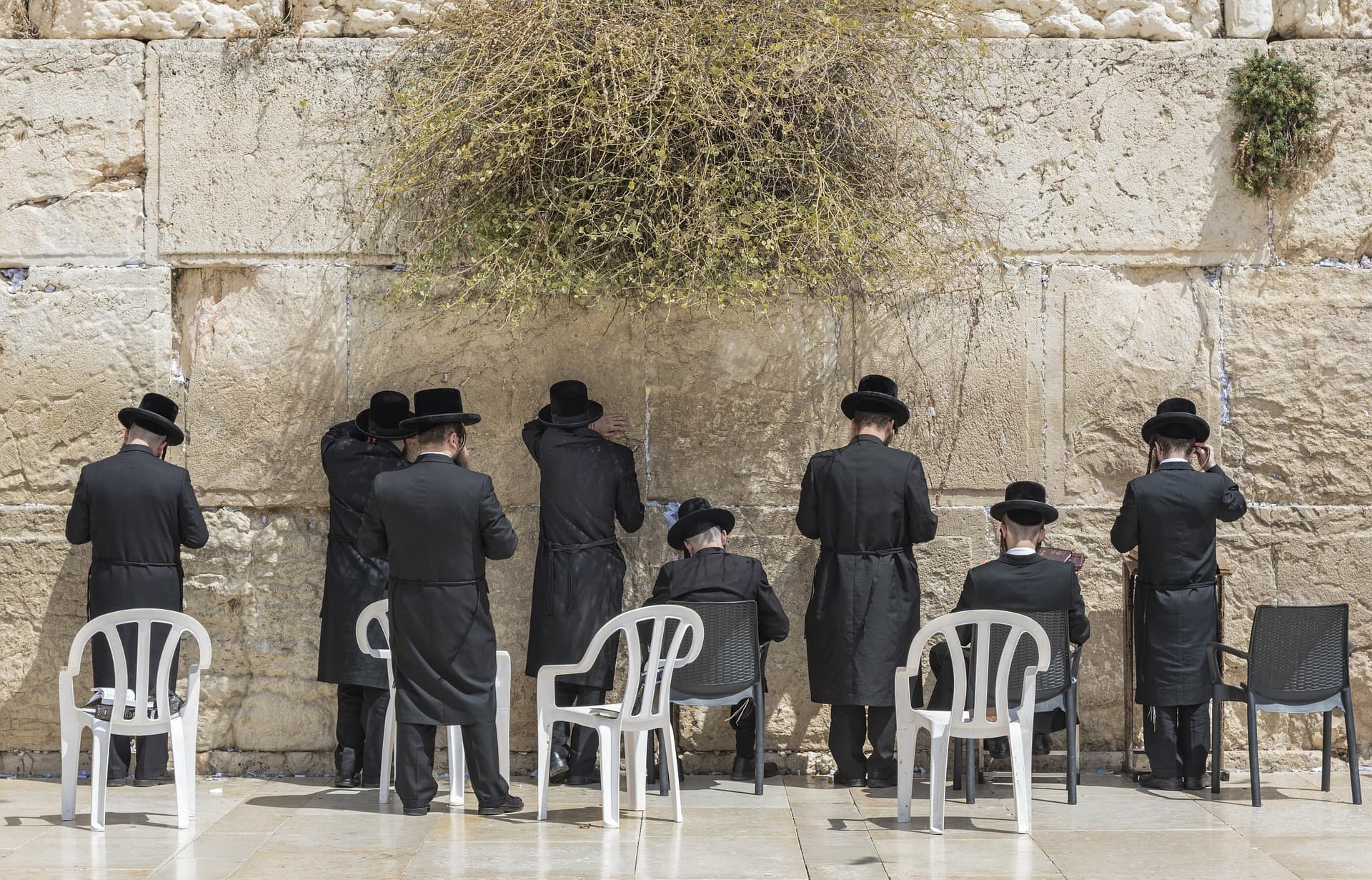
Jewish Men Praying at the Western Wall in Jerusalem
According to Jewish tradition, Moses led his people out of Egypt, where they had been slaves, and to the “Promised Land” in Canaan. There the kingdom of Israel was established and was ruled over by a series of kings, including David and his son Solomon, who built the First Temple in Jerusalem. This temple was later destroyed by the invading Babylonians.
Much of Jewish history has involved long periods of persecution and exile from their homeland. When invading empires conquered the kingdom, the Israelites were forced into diaspora or held in captivity, often forbidden from practicing their religion.
Led by a group of rebels known as the Maccabees, the Jewish people were able to reclaim the land of Judah (Judea) for a time and rebuild the temple. However, around 60 B.C.E., the Roman Empire conquered Jerusalem, placing the Jewish people under rule for centuries. In 70 C.E., the Romans destroyed the Second Temple.
Multiple Jewish rebellions attempted to win freedom from Roman rule, culminating in the Bar Kokhba revolt. This failed revolt resulted in devastating losses, with thousands killed and Jews expelled from Jerusalem. Forced into exile, the Jewish people would not officially return to “Canaan” until 1948 when the State of Israel was established despite ongoing territorial conflict between Jews and Arabs.
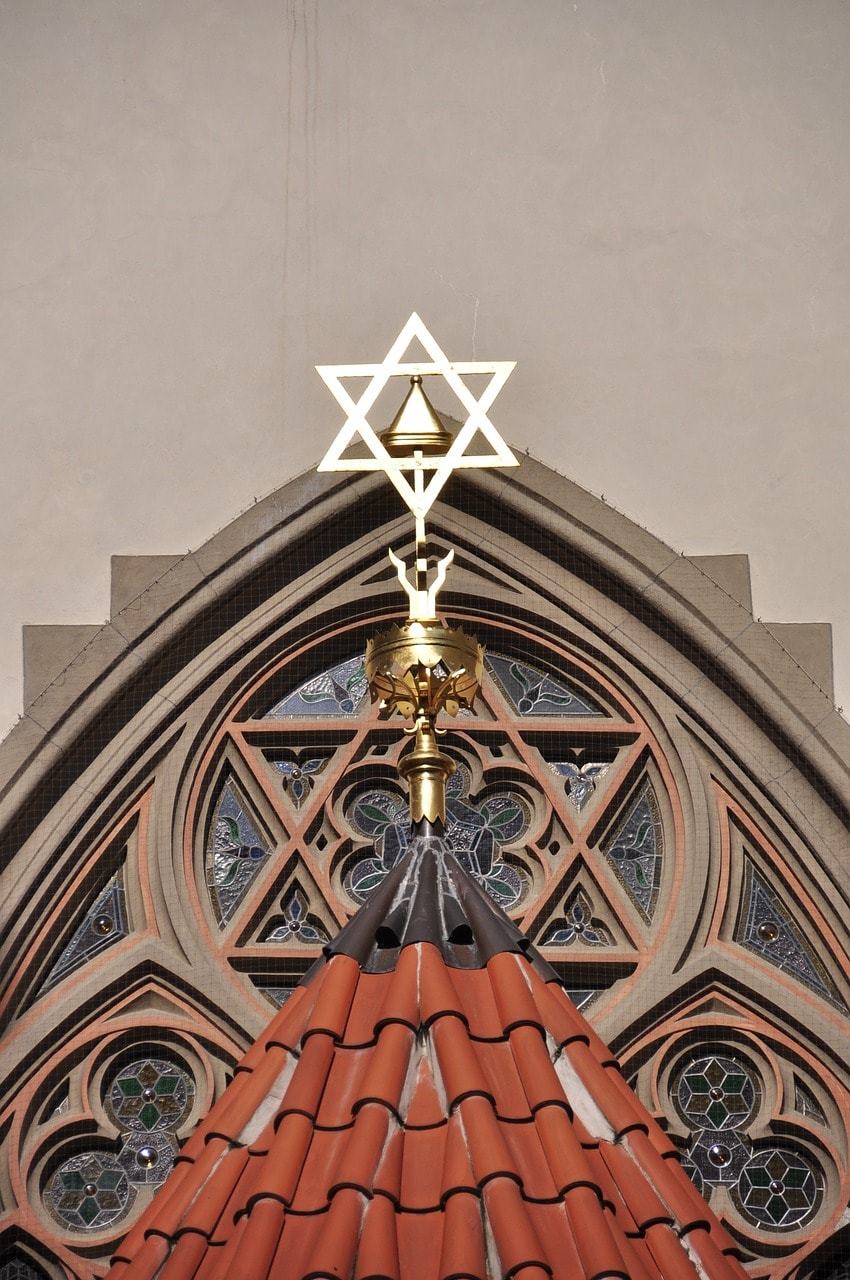
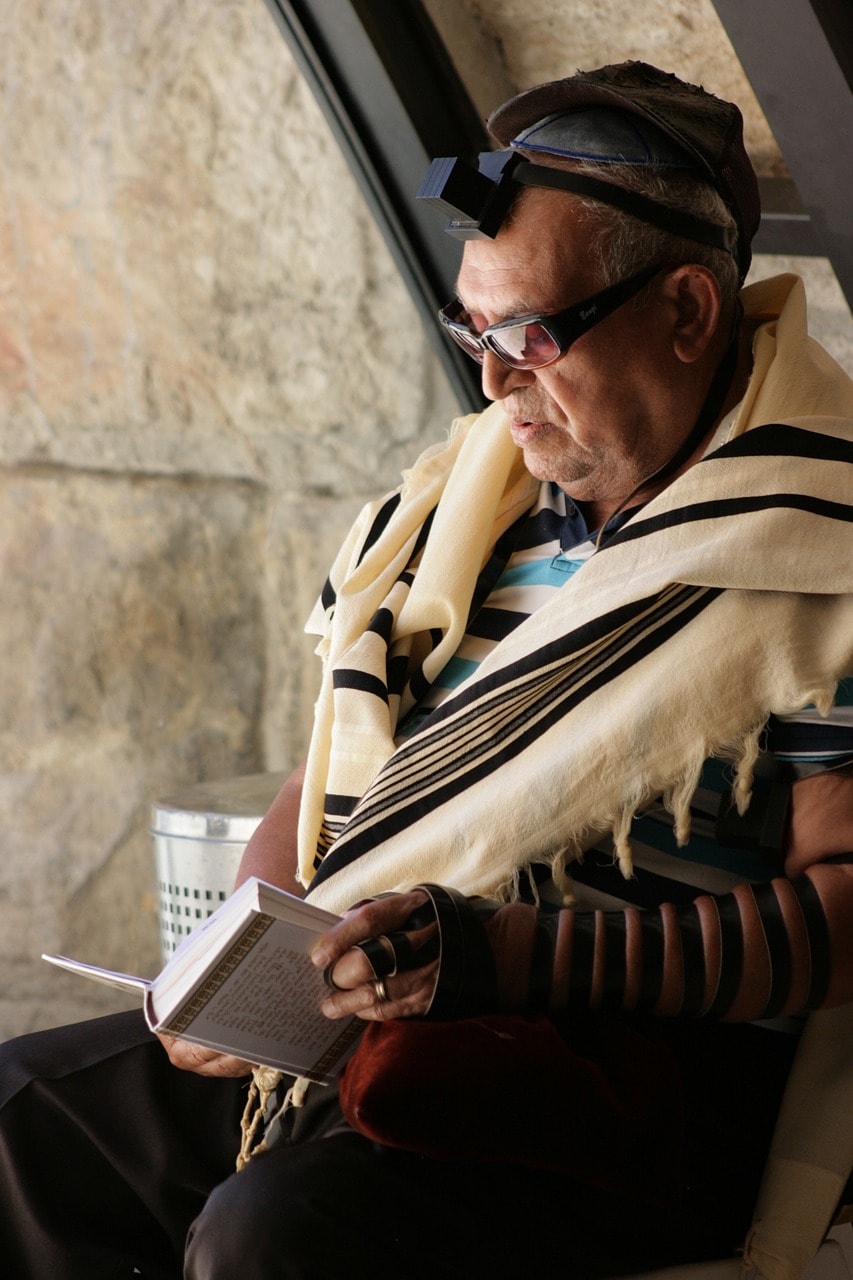
Man praying with tefillin
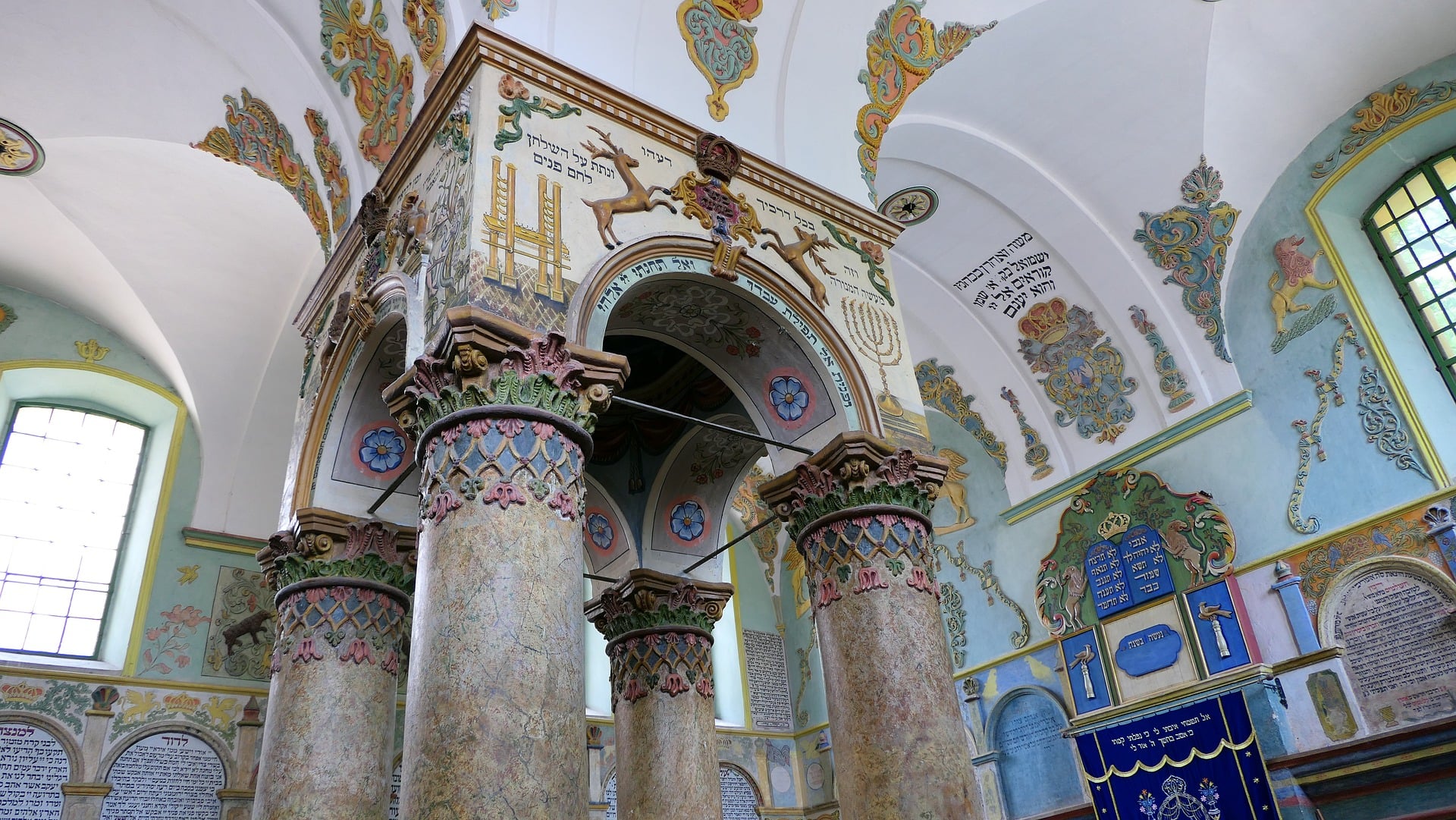
Synagogue in Łańcut, Poland
The Jewish Scriptures
There are three main common texts in the Jewish faith. The first is the Tanakh, which includes many of the same books as the Christian Old Testament, though in a different order. “Tanakh” is an acronym standing for the parts of the book: the Torah, the prophetic books (Nevi’im), and the Writings (Ketuvim), which includes poetry.
The Talmud are Rabbinic teachings, while the Midrash is the “oral Torah,” said to be additional teachings given to Moses not written in the Torah. Together, these three texts make up the foundation of the Jewish faith. The Torah includes the Ten Commandments, while these scriptures also reveal God’s covenant with and promises for the Chosen People.
Today, religious Judaism is generally divided into three categories: Orthodox, Conservative, and Reform. The Orthodox sects strictly adhere to traditions and include the ultra-Orthodox, who often shun non-Jewish communities. The Conservative (or traditional) Jewish branch is not as strict as Orthodox, but still adheres to many traditions with updates for modern living. Reform, which represents the majority of American Jews, emphasizes ethical practice over legalistic living.
Traditionally, Judaism teaches that a Messiah will rise to redeem the Jewish people and serve as the heir to King David. The belief that the Messiah will be a literal man is not shared by all Jewish believers, but it is generally agreed that he (or the Messianic Age) is yet to come.
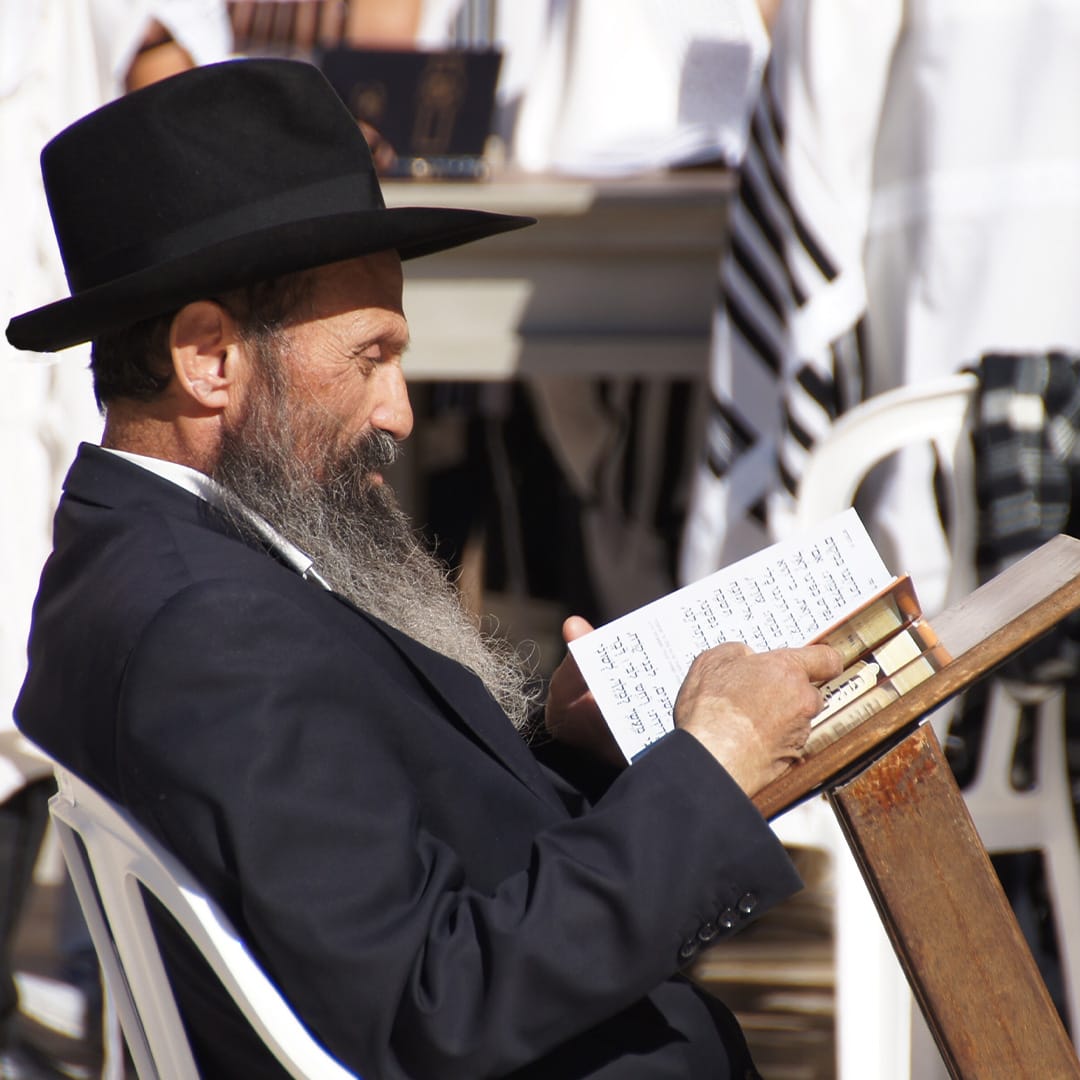
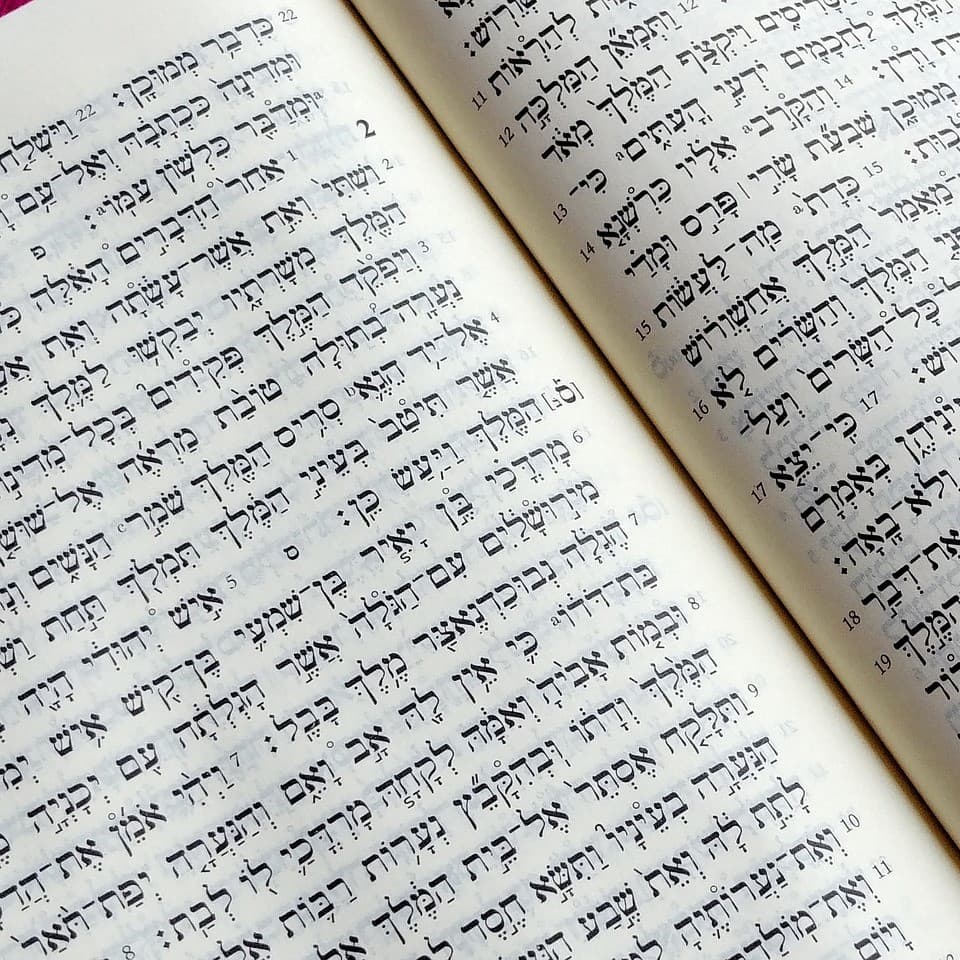
Antisemitism and the Holocaust
The Jewish people have historically been the victims of a form of bigotry known as antisemitism. This hatred, which has led to centuries of persecution, oppression, and murder, has at times been supported by Christian leaders, including Martin Luther, who blame the Jews for the death of Jesus Christ (himself Jewish).
Throughout history, especially in Europe, Jews have been baselessly accused of all manner of evil, from causing the Bubonic Plague in the Middle Ages to drinking the blood of Christian children.
Though Jews have been persecuted for centuries, the most horrific expressions of antisemitism occurred in the 20th century, beginning with the 1903 publication of Protocols of the Elders of Zion in Russia. This fabricated work purports to describe a secret Jewish plot to rule the world. Many of the false ideas in Protocols remain popular among antisemites today.
When the Nazis rose to power in Germany under Adolf Hitler in the 1930s, German Jews faced brutal persecution. During Kristallnacht in 1938, thousands of Jewish-owned businesses, homes, and other property were destroyed. Throughout World War II, Nazis arrested and held Jews in brutal concentration camps. Six million Jews were killed by Germany during this period, known as the Holocaust, along with millions of other “undesirables,” including the Roma, people with disabilities, and homosexuals.
Jews were also persecuted in Russia, particularly under Josef Stalin. Throughout much of the 19th and 20th century, Jewish communities were subjected to “pogroms,” a Russian term for “wreaking havoc.” Both Russian leaders and the German invaders during WWII encouraged these attacks on Jewish citizens.
Since the war, antisemites have falsely claimed that the Holocaust was a Jewish hoax to gain sympathy from world powers.
The persecution of Palestine
It can be difficult to separate the very real concerns of modern antisemitism from the accusations that modern Israel is an apartheid state, as has been claimed by human rights associations and members of the United Nations. Following World War, the United Nations adopted the Partition Resolution in November 1947, which established both a state of Israel and Palestine. However, following the resolution, five Arab nations that opposed the resolution attacked the Israeli territory in what came to be known as the Arab-Israeli War of 1948. Israel withstood the attack and remained an official state recognized by the UN, whereas Palestine did not. However, the Palestinian people have continued to legally occupy land in the region, including parts of Jerusalem and the West Bank, which Israel has been accused of illegally occupying with its military.
Israel has been accused of targeting medical facilities, and it has allegedly forced Palestinian residents of the Gaza Strip into a “humanitarian crisis” by blocking free movement of people and goods. Amnesty International also alleges that Palestinians in the West Bank have been subjected to “forced evictions, arbitrary detention, torture and other ill-treatment.”
Supporters of Israel adamantly reject these claims, arguing that Arab Muslims in the region are given full rights. Modern critics of the state of Israel frequently face accusations of antisemitism, even though many critics are Jewish. In fact, among American Jews, support for Israel is often divided along religious lines, with Orthodox Jews far more likely to support Israel and its actions than Reform or non-religious Jews. Still, most Jewish people in the US say they have an emotional attachment to Israel.
One thing is indisputable: in the decades-long armed conflict between itself and the unofficial state of Palestine, Israel is by far the wealthier and better armed nation—in part due to military and financial support from the United States.

A Soldier's Prayer by Adam Fagen, licensed under [CC BY-NC-SA 2.0 DEED], from Flickr